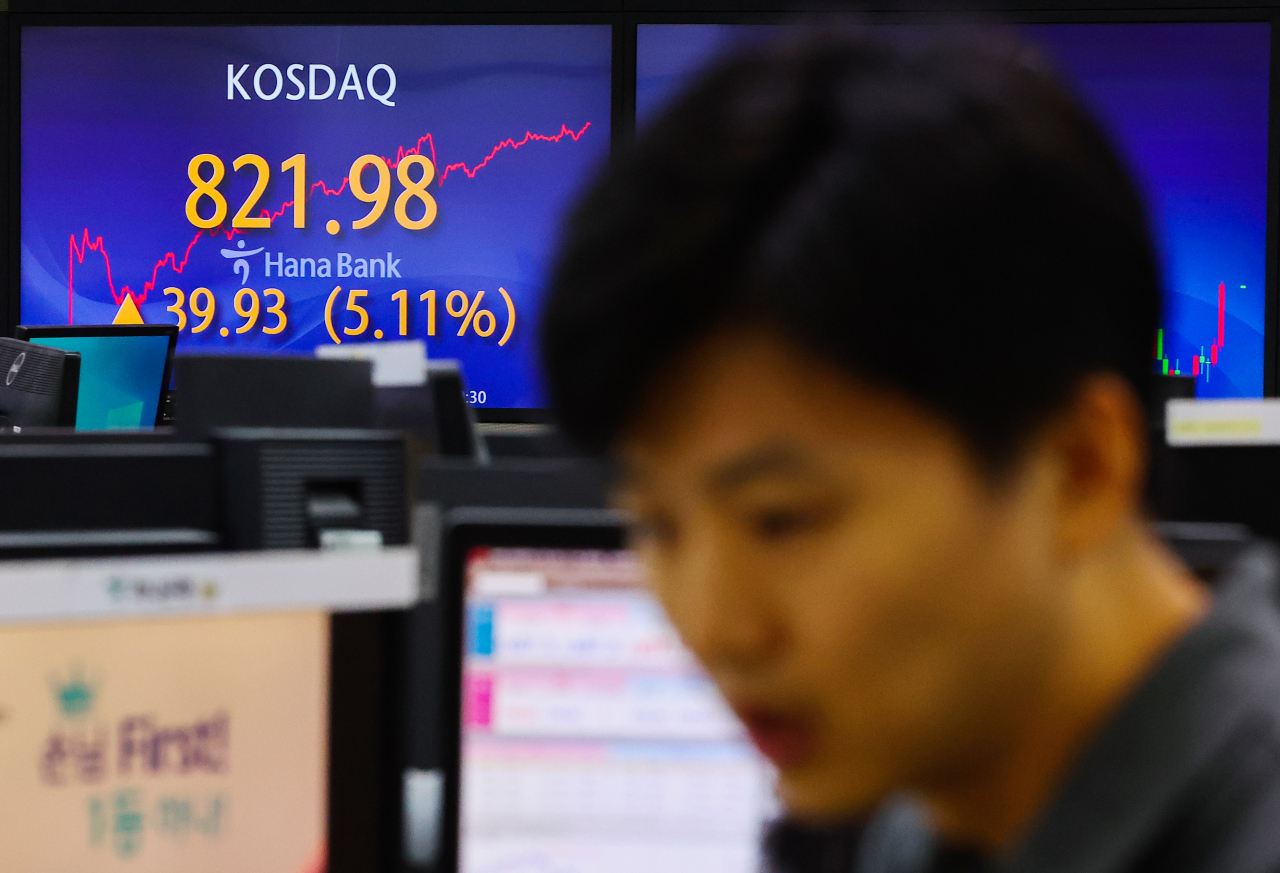Kosdaq volatility persists after short selling ban
Kosdaq market experiences increased volatility, another sidecar halt
By Song Seung-hyunPublished : Nov. 7, 2023 - 16:06

Following the implementation of the short selling ban on Monday, the secondary Kosdaq market has been on a roller-coaster run, with five-minute suspensions of trading kicking in two days in a row to tame market volatility.
Sidecar curbs were triggered on the tech-heavy Kosdaq once again Tuesday, just a day after they were imposed for the first time in three years.
The trading curb was applied after the Kosdaq 150 futures plummeted 6.46 percent from the previous day, as the Kosdaq 150 index had also dropped 3.08 percent at 11:48 a.m. on Tuesday.
Program trading on the secondary bourse is halted when the Kosdaq 150 futures rise or fall by more than 6 percent, or when the Kosdaq 150 index fluctuates by more than 3 percent.
A five-minute trading halt was initiated at around 10 a.m. Monday following a surge of over 5 percent.
The soar on Monday was due to the expectation that investors would start to cover their short positions after the country’s financial authorities banned short selling.
“Market expectations for the short selling ban diminished, leading to increased selling,” analyst Park Sang-hyun of HI Investment and Securities said about the situation on Tuesday.
He added that short covering for the second battery sector, which drove the surge Monday, is mostly complete, and that those investors seem to be willing to sell for profit.
The halting system was introduced in March 2001. Tuesday marked the 50th time that it was triggered.
The Kosdaq index closed at 824.37, down 15.08 points, or 1.8 percent, from the previous day.
Meanwhile, the Kospi, Korea's main bourse, was also impacted by the repercussions of short selling. On Tuesday, the Kospi index closed at 2,443.96, marking a fall of 58.41 points, or 2.33 percent, from the previous day. At one juncture on Tuesday, it had dipped to 2,418.74. This significant drop followed a substantial surge of 134.03 points, or 5.66 percent, that had propelled it to 2,502.37 on Monday.
On Sunday, South Korea's financial authority made the decision to impose a short selling ban, effective through the end of June.
Short selling is a practice involving the sale of borrowed shares with the intent to repurchase them at a lower price and profit from the price difference upon returning them.
Although limited to stocks included in the Kospi 200 and Kosdaq 150 indices, short selling had been permitted in South Korea until last week. The limit followed a ban initially implemented in 2020 during COVID-19, which had not been entirely lifted.
This marks the fourth occasion that South Korea has imposed a short selling ban, following others in 2008, 2011 and 2020.
Sunday’s regulatory decision was prompted by a series of short selling violations committed by foreign firms.
There has also been a growing sentiment among Korean investors that stricter regulations are needed to address illegal short selling.
A petition posted on the website of the National Assembly on Oct. 4 calling for improvement of the short selling system for the stability and fairness of the securities market was signed by more than 50,000 people.
Also, Financial Supervisory Service Gov. Lee Bok-hyun on Monday emphasized that, for the time being, financial authorities consider gaining trust from individual Korean investors a higher priority than building foreign investor confidence, and so decided to apply the ban.
Even after witnessing two consecutive days of market turbulence, the financial authorities remain firm in their stance.
"In the current situation, we see that temporarily banning and improving the short selling system will be beneficial for the long-term development of the capital market," Financial Services Commission Chairman Kim Joo-hyun said on Tuesday.
Despite financial authorities' intentions to apply the ban to prevent illegal short selling practices by large institutional investors and to protect retail investors, it has also raised concerns about the erosion of foreign investors' trust in the market.
Some industry insiders have raised concerns that the ban could distract Korea from its objective to seek an upgrade in the MSCI index, a stock index provided by Morgan Stanley, which could also affect the Korean government's goal to attract more foreign investors.



















![[Today’s K-pop] Treasure to publish magazine for debut anniversary](http://res.heraldm.com/phpwas/restmb_idxmake.php?idx=642&simg=/content/image/2024/07/26/20240726050551_0.jpg&u=)